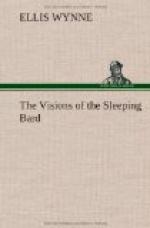The Bardd Cwsc is not only the most popular of Welsh prose works, but it has also retained its place among the best of our classics. No better model exists of the pure idiomatic Welsh of the last century, before writers became influenced by English style and method. Vigorous, fluent, crisp, and clear, it shows how well our language is adapted to description and narration. It is written for the people, and in the picturesque and poetic strain which is always certain to fascinate the Celtic mind. The introduction to each Vision is evidently written with elaborate care, and exquisitely polished—“ne quid possit per leve morari,” and scene follows scene, painted in words which present them most vividly before one’s eyes, whilst the force and liveliness of his diction sustain unflagging interest throughout. The reader is carried onward as much by the rhythmic flow of language and the perfect balance of sentences, as by the vivacity of the narrative and by the reality with which Ellis Wynne invests his adventures and the characters he depicts. The terrible situations in which we find the Bard, as the drama unfolds, betoken not only a powerful imagination, but also an intensity of feeling which enabled him to realise the conceptions of such imagination. We follow the Bard and his heavenly guide through all their perils with breathless attention; the demons and the damned he so clothes with flesh and blood that our hatred or our sympathy is instantly stirred; his World is palpitating with life, his Hell, with its gloom and glare, is an awful, haunting dream. But besides being the possessor of a vivid imagination, Ellis Wynne was endowed with a capacity for transmitting his own experience in a picturesque and life-like manner. The various descriptions of scenes, such as Shrewsbury fair, the parson’s revelry and the deserted mansions; of natural scenery, as in the beginning of the first and last Visions; of personages, such as the portly alderman, and the young lord and his retinue, all are evidently drawn from the Author’s own experience. He was also gifted with a lively sense of humor, which here and there relieves the pervading gloom so naturally associated with the subject of his Visions. The humorous and the severe, the grotesque and the sublime, the tender and the terrible, are alike portrayed by a master hand.




